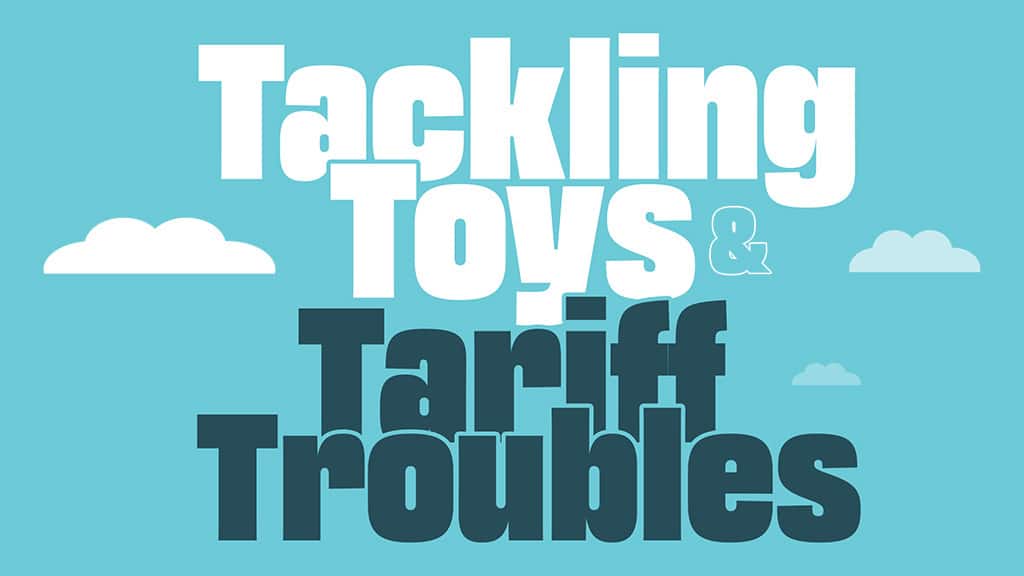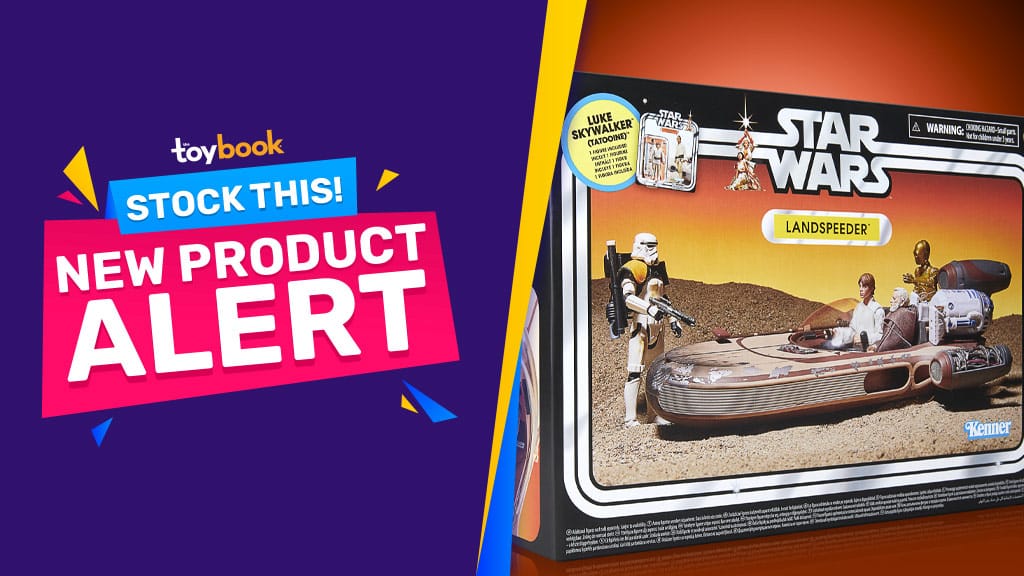Independent Toy Stores Focus on Creativity and Community
With rapidly changing tariff rates in effect and economic uncertainty lingering, specialty toy stores are navigating the same choppy waters as their vendors, learning, adapting, and evolving together as they work to fill shelves and spark joy in the hearts of little ones across the country.
Trends shift, brands come and go, and each store curates its own unique style. One thing remains constant: kids still wake up eager to play with their favorite toys. Despite the turbulence, a new wave of independent toy stores is stepping up and leaning into immersive experiences and strong community ties to bring the power of play to the masses, one toy or game at a time.
STANDING OUT, SHOPPING IN
Specialty toy stores often implement different variables to stand out from mass retailers and the immediacy of online shopping, especially in light of potential price hikes. In-store events, collaborations, and unique displays can help these stores become community centers and a family’s toy retailer of choice.
Jess Stetson, Owner and Founder of The Pieceful Project, operates two stores in Northern Illinois and has tapped into a specific niche of LEGO builders, puzzlers, and gamers. Stetson’s mission was to create a safe, educational space for community members of all ages to tap into or discover new favorites, including Dungeons & Dragons or Magic: The Gathering.
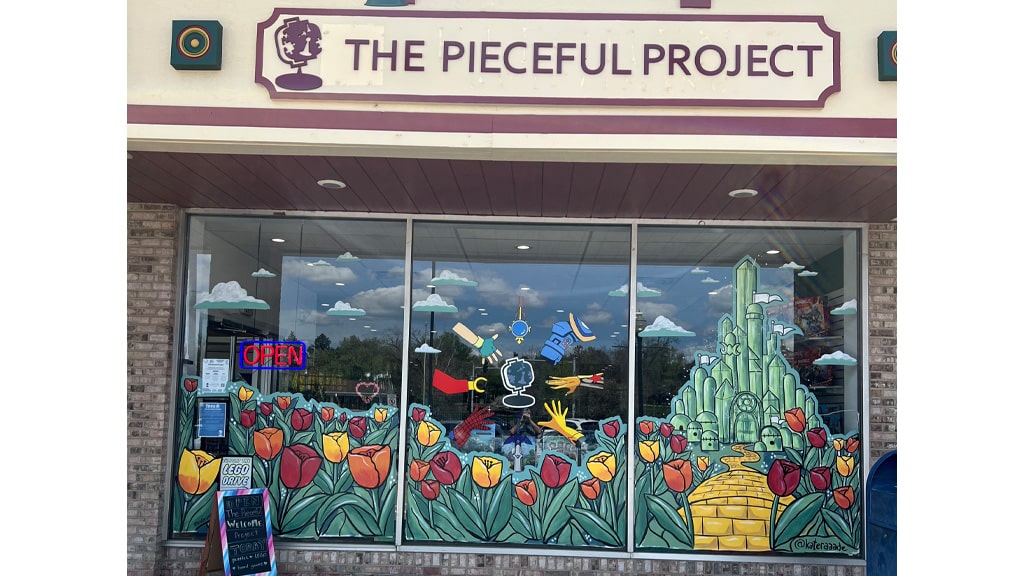
“What I wanted to do was to create a bright, open space where the non-traditional demographics [of game stores] could come in and learn a new game. Our Dungeon Master is a 10-year-old kid, and he knows exactly what he’s doing, he’s all over it, and he’s just absolutely dominating, but that’s not an experience he would probably get if he were playing at a different type of store.”
The Pieceful Project offers game and LEGO set rentals, consulting services, and a consignment program for kids. Families can try before they buy, while builders can enjoy sets without needing display space. Kids can consign toys and games to earn money, gaining lessons in financial literacy and communication through low-pressure, hands-on business experiences with store staff.
Familia Toys, a new specialty toy store in Salina, Kansas, hosts several events designed to draw customers away from the screen and into the store. After opening its doors in April, the family-run business has implemented different play days and collaborates with other local businesses on events.
“We have First Friday events where pop-ups come into our store, attracting a different client base as they [the other stores] advertise their following. We partnered with a dance studio/music studio in town and did a royal ball with everything ‘princess,’ including the royal ball gowns,” says Familia Co-Owner and Operator Yesica Swenson.
At Familia, little ones can create their own wish lists in person. “We are doing toy crates so kiddos, moms, couples, and more can come make a registry for birthdays, showers, weddings, etc., then their families can come in and get their items [from the crate] on a quick run in through lunch or can look longer if they want,” Swenson mentions. The team also has Train Play Day, where kids can play with BRIO products all day long, and Jigsaw Jams, where teams compete to finish a puzzle first.
While communal activities set independent toy stores apart from the fast-paced finds online, a few other factors contribute to each customer’s decision to buy in-store rather than online.
INCLUSIVE, IN-STORE OPTIONS
The warm, curated touch of a local store offers individualized benefits. At The Pieceful Project, inclusivity is a top priority. Stetson takes several steps to ensure customers can enjoy in-person shopping and access to much-needed resources. Both stores are certified through KultureCity, an organization that helps businesses become sensory inclusive. The larger of her two stores, in Cary, Illinois, has a sensory room.
“[For] people who want to lean in because they have neurological differences, my son is autistic as an example, the Cary store is often a better fit because if you’re feeling overwhelmed, you have that quieter space you can go to.” The retailer also provides a space for the Geek Therapy Guild, an organization that implements D&D as a therapy tool, to play.
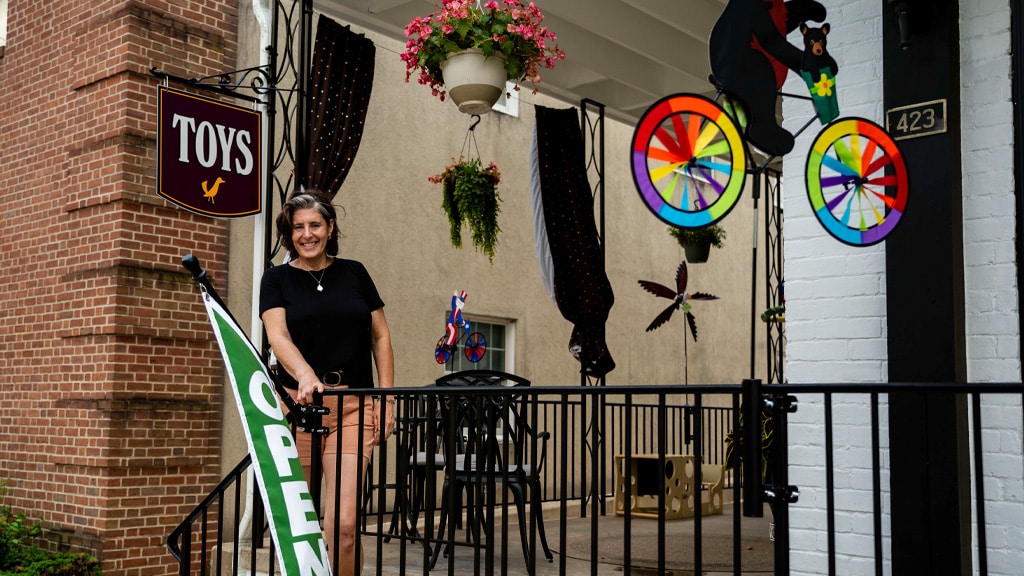
For toy connoisseurs like Nicole Desaulniers, Owner of The Mulberry Moose in Williamsport, Pennsylvania, opening a storefront is the first step toward magical, inclusive community experiences. Desaulniers saw a need for a local toy store, noting that families only had Walmart and other mass retailers nearby for their toy needs, and opened her storefront on Mulberry Street last summer.
“A lot of the kids here have never been in a toy store, so they come in and they’re just like, ‘wow!,’” she explains. It’s a response that Desaulniers hopes to continue hearing as she welcomes new customers and old friends.
NAVIGATING TARIFFS
At the time of publication, The White House has issued a sweeping range of tariffs on goods made outside the U.S. Toys, games, and other products relevant to the toy industry that are manufactured in other countries could face tariffs of 10-30% or higher. Since most American toy companies outsource production and several popular toy companies are based in Europe and Asia, specialty toy stores might face repercussions, but it all depends on how negotiations settle. The constant back and forth with trade policies has created difficulty and uncertainty in forecasting. For Stetson, who orders many LEGO products imported from Europe, that means scaling back on orders.
Tariffs and market volatility have a unique effect on toy stores that opened within the past year. Within the first year, specialty stores are still determining what products do well for their audience and what pricing strategy makes sense.
Desaulniers, who often introduces the community to new and interesting brands, has taken advantage of promotional deals and ordered stock in advance. “If I don’t have product, I can’t sell product, and who knows what’s going to happen, whether that’s even going to be an issue … But Hape and eeBoo, they’re two of my top vendors [at The Mulberry Moose],” she says. “I placed two giant orders with each of them, one to ship now, one to ship at their latest date.”
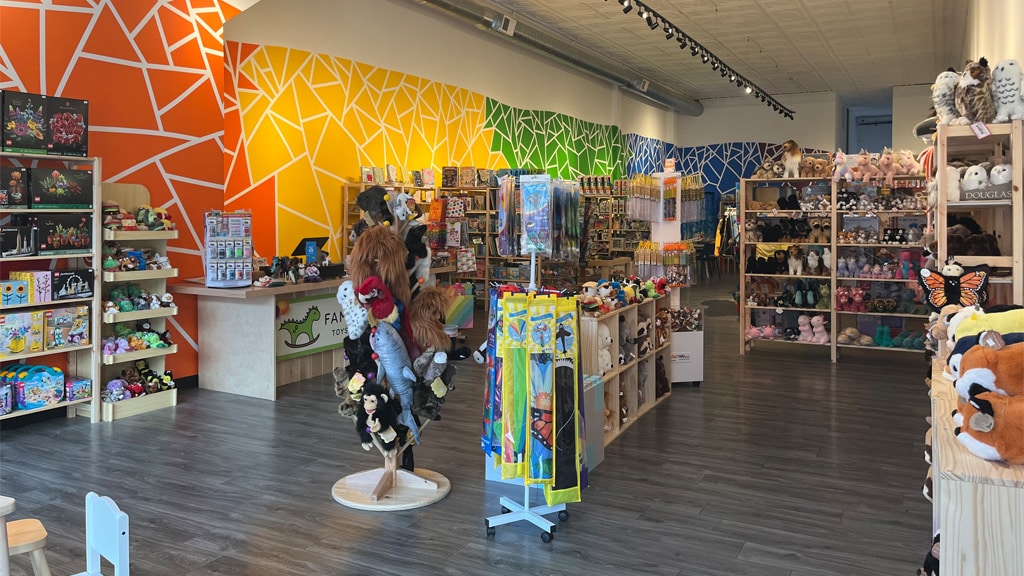
For owners who cut the grand opening ribbon right in the middle of the turmoil, it’s expected. “It is a gamble as, being new, we don’t really know our full month-to-month … given the only history we have is our opening month [April 2025],” Swenson mentions. “Tariffs are not ideal, but we are working with what we got — we really don’t know [the industry] without them, so we are just rolling with the punches.”
Despite their offerings, both product- and event-wise, most specialty stores are relying on local support as they navigate supply chain challenges. “I’m hoping we can lean on the community that we have built of people who I know want us to succeed and can help lean in on that,” Stetson adds.
STOCKING THE SHELVES
As stockrooms shift, their operators feel confident in products that draw eyes, hands, and wallets. From puppets and puzzles to costumes and candy, there are millions of options to stock. For some, the answer to “how can I fill my shelves” dates back to childhood.
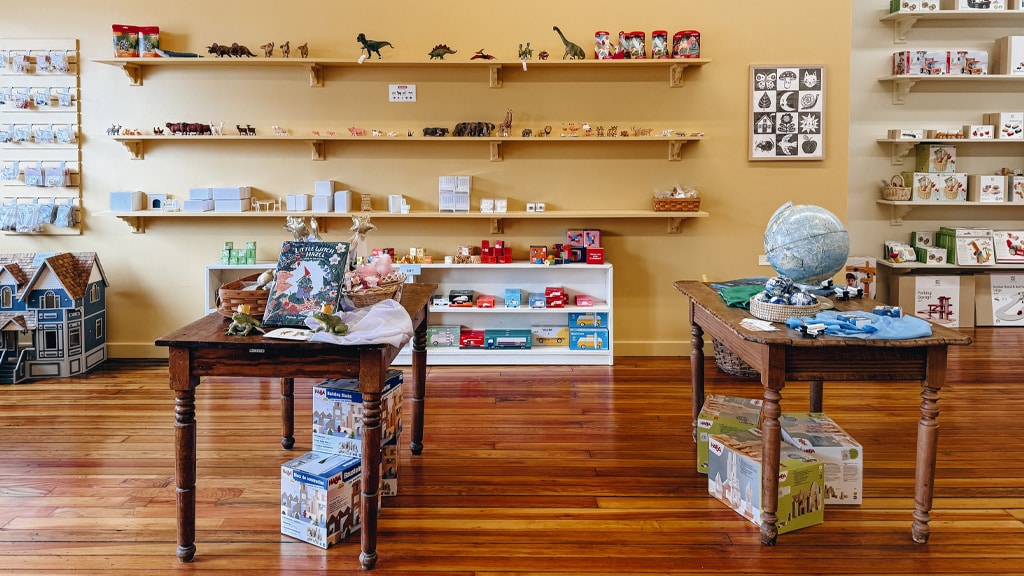
“I started with things that my own children have and love and then went from there,” Leah Gaeddert, Manager of Prairy Toy Store in Kansas, says. Part of a larger storefront and “Prairy” brand, the toy store opened in April. It features open-ended play toys like musical instruments, dolls, baby items, and more. Gaeddert says books and stuffed animals are frequently brought to the register.
Familia’s Swenson expresses similar feelings. “We have three children ourselves and always found it hard to find good quality games and educational toys within Salina, so we would always travel outside of town to find what we wanted for our kids to have as toys,” she says.
Mulberry Moose hails Schylling’s NeeDoh, Folkmanis Puppets, and assorted baby toys as big hits, but they’re not the only big hits at the store.
“Another area that does really well for me is dress up,” Desaulniers says. “Great Pretenders has been huge. People don’t have access to that around this area, and so they’ve really enjoyed coming in and doing that.” The thrill of coming into a store and trying on a princess dress just can’t be replicated digitally.
“If something in the climate of toys changed where I would be forced into the online [store], I would close. I’m not interested in doing that. My interest is having something in the community and providing something for the community that they can’t get already,” she mentions. “For me, just selling toys online isn’t doing it; it’s not my purpose.”
STICKING TOGETHER, SPECIALTY STYLE
Specialty toy stores are banding together to serve their communities in the best way possible while navigating a contentious economic climate and ever-changing global trade policies. In Stetson’s mind, having other game stores with different audiences nearby can be beneficial to all.
“I want those people [other toy and game store owners] to be on my team because we build a stronger community together … I would much rather send somebody local than send somebody online,” Stetson says.
Following mainstream coverage of tariff concerns, and calls for advocacy from toy and game manufacturers of all sizes, the owners of new specialty toy stores have joined the chorus of voices in the industry, hoping for a change. For Desaulniers and other owners, it’s all about supporting one another.
“I’m appreciative of how the community of toy manufacturers, toy vendors, toy stores, ASTRA, The Toy Book, everyone’s coming together around this issue and really trying to figure out how we’re all going to move forward with it.”
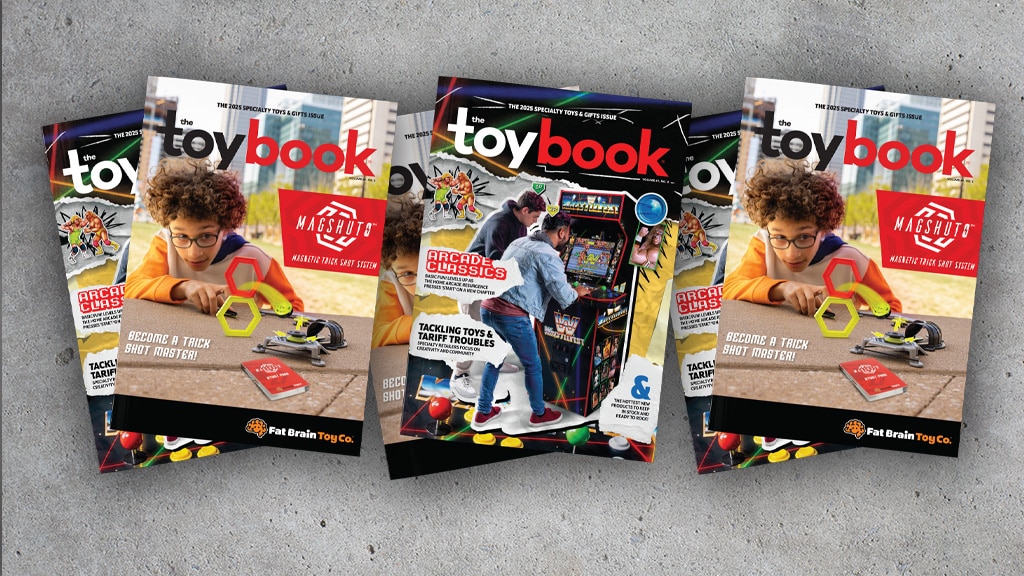
Stay on the Pulse of Play!
A version of this feature first appeared in The Toy Book‘s 2025 Specialty Toys & Gifts Issue. Click here to read the full issue!
Want The Toy Book delivered straight to your desk? Subscribe here and never miss a beat in the world of toys and play! Get seven big issues in print each year.

